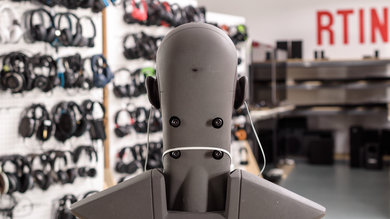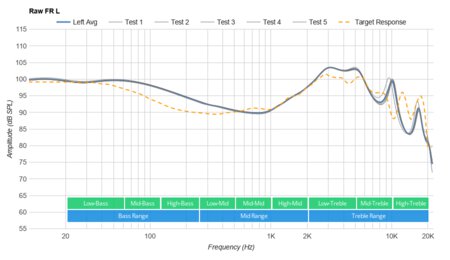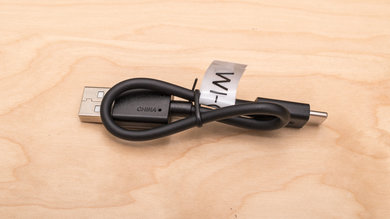The Sony WI-C310 Wireless are budget-friendly neckband in-ear Bluetooth-only headphones. They have a very lightweight, portable, and flexible neckband design. These are decent all-around headphones without added features like a companion app in a crowded market of similarly designed wireless neckband in-ears. If color isn't a concern, the step-down Sony WI-C200 Wireless offer similar performance.
Our Verdict
The Sony WI-C310 are good for neutral sound. While they have a good audio profile for this purpose, their bass is a bit boomy. Overall, mid-range instruments and treble frequencies offer detail and clarity. Unfortunately, they don't have a dedicated companion app with an EQ to customize their sound to your liking.
- Excellent frequency response consistency.
- Good battery life.
- Slightly cheap build quality.
The Sony WI-C310 are satisfactory for commuting and travel. They're very portable, can easily rest around your neck, and have a long battery life for trips. The isolation performance is decent, but they don't do well against deep engine rumbles because they are passive isolation-only. On the upside, they don't leak too much audio to your neighbors.
- Excellent frequency response consistency.
- Portable and flexible around-the-neck design.
- Good battery life.
- Slightly cheap build quality.
- Mushy control buttons.
- No IP rating.
The Sony WI-C310 are very good for sports and fitness with the caveat that there's no IP rating against moisture or dust. These headphones are very portable and easy to carry around to the gym. Their bud design is very small and doesn't trap heat inside your ear, which is great since you won't sweat more than usual wearing them. They are also stable enough for working out, but since the cables are very long, they create big loops, and pulling the headphones out of your ears is easy.
- Excellent frequency response consistency.
- Portable and flexible around-the-neck design.
- Breathable design.
- Mushy control buttons.
- No IP rating.
The Sony WI-C310 are satisfactory for office use. The small buds are fairly comfortable to wear for a while, but the in-ear fit might not be for everyone. Their noise isolation blocks office work environment noises like ambient chatter and fans but doesn't impact low-pitched noise like active noise cancelling earbuds can. Also, they have a long 17-hour battery life, so they'll last you for a couple of work days before needing charging. However, they don't automatically turn off, so if you get up from your desk and leave them there, be sure to turn them off.
- Excellent frequency response consistency.
- Good battery life.
- Slightly cheap build quality.
- Mushy control buttons.
The Sony WI-C310 are inadequate for wireless gaming. The Bluetooth-only headphones have poor latency. The headphones won't be suitable for video games, and their in-line microphone recording quality won't be comparable to gaming headset boom microphones. Also, you can't customize them, and they don't have a feature-packed app like some headsets do.
The Sony WI-C310 are Bluetooth-only and aren't compatible for wired gaming.
The Sony WI-C310 are fair for phone calls. One of the upsides is that they have a sidetone for phone calls, but if you don't want to hear your voice, that's a downside because you can't turn it off. While adequate, the mic captures pretty thin-sounding speech and struggles to parse your voice from ambient noise.
- Excellent frequency response consistency.
- Sub-par microphone.
Changelog
- Updated Jan 16, 2024: We've updated this review's text to ensure it's up to date and accurate.
- Updated Aug 05, 2021: Converted to Test Bench 1.5.
- Updated Feb 05, 2020: Converted to Test Bench 1.4.
- Updated Nov 21, 2019: Converted to Test Bench 1.3.1.
Check Price
Differences Between Sizes And Variants
The Sony WI-C310 come in three color variants, 'Black,' 'Blue,' and 'White'. Previously, there was a 'Gold' model. We tested the 'White' model. We expect all color variants to perform similarly to our model.
If you encounter another variant, please let us know in the forums, and we'll update our review.
Popular Headphones Comparisons
The Sony WI-C310 are pretty basic around-the-neck headphones that don't particularly stand out from the competition. They offer a neutral sound profile with some extra boom in the bass region, making them a good contender for budget-friendly wireless earbuds. While adequately stable to wear, which suits sports and exercise activities, the lack of an IP rating is unfortunate. In the neckband headphones niche, the Beats Flex Wireless are well-regarded with Apple-friendly features like the W1 chip for seamless pairing to Apple devices. Comparatively, the Skullcandy Jib Wireless are similarly comfortable to the Sony WI-C310, deliver more bass, and only have a single button for controls (unlike the Sony WI-C310's 3-button control module).
See our recommendations for the best headphones, the best earbuds, and the best neckband headphones.
The Beats Flex Wireless and the Sony WI-C310 Wireless are similarly performing headphones; you may prefer one pair over the other. The Beats are more comfortable, better built, and have a more stable fit. They also have a W1 chip, so you can seamlessly pair them with Apple devices. However, the Sony headphones have a better balanced sound profile, which some users may prefer, and longer continuous battery life.
The Sony WI-C310 Wireless and Sony WI-C200 Wireless headphones are very similar. The main difference between the two models is that the WI-C310 have flat cables, while the WI-C200 have thin cables. The WI-C310 are available in more colors and have slightly better isolation performance.
The Sony WI-C310 Wireless are better than the Sony WI-XB400 EXTRA BASS Wireless in mixed usage. They perform similarly in most aspects, but the WI-C310 have a more neutral sound since they don't have the extra emphasis in the bass. Also, the WI-C310 have better noise isolation, especially in the treble range, but the microphone quality is significantly worse.
The Sony WI-C310 Wireless are better neckband headphones than the Sony WI-C400 Wireless. Their flexible neckband is easy to fold into a more compact format that fits most pockets. The WI-C310's sound profile sounds significantly better, and the headphones take less time to charge. On the other hand, the WI-C400 have NFC pairing and a Bluetooth sync button with the older Bluetooth 4.2, but the WI-C310 are Bluetooth 5.0 and have noticeably better wireless range.
Test Results

The Sony WI-C310 are fairly simple around-the-neck headphones with a soft and flexible neckband design. The cabling is flat and fairly long, which creates a big loop when putting them in your ears. The buds are very small and don't protrude much from your ears. They come in different colors: white, black, blue, white, and gold. If you don't mind the color of your headphones, look at the near-identical Sony WI-C200 Wireless.
These feel satisfactorily comfortable for in-ears. They don't go too deeply into your ear canal and don’t apply pressure inside your ear since the buds are very small. The headphones feel lightweight, but their long cables can be annoying, as they can snag on something and pull the buds out of your ears.
They come with three tip sizes to help you find the most comfortable fit. That said, their in-ear fit can cause slight fatigue if you're wearing them for extended periods.
The headphones have a pretty straightforward in-line remote with a three-button scheme. You have audio cues when skipping tracks and when reaching maximum and minimum volume. A clear voice prompt helps during the pairing procedure. Unfortunately, the buttons are a bit mushy, making tactile feedback underwhelming. Adjusting the volume using the control module during a call won't impact your music volume playback. The depth of controls varies depending on whether your device is compatible with Hands-free Profile. If your device is incompatible with the Hands-free Profile, the functions are the same except for the press and hold functions for the multi-purpose button during calls.
'+' button
- Single press: Raises volume.
- Press and hold: Skip track forward.
Multi-purpose button
- Single press: Powers on. Plays and pauses audio. Also answers and ends a call.
- Double press: Voice assistant.
- Press and hold: Switches between the headphones and the phone for the call's audio during a call and an outgoing call. Reject incoming calls. Power off.
'-' button
- Single press: Lowers volume.
- Press and hold: Skips to previous track.
Thanks to the flexible neckband design, the headphones are remarkably portable, can easily be folded into a more compact format, and will fit in most pockets or a bag. They're also quite easy to carry around your neck, with the magnetic buds securing the ends together. These headphones don't take up much space, but unfortunately, they don't come with a case to protect them. This can lead to snags or tangling.
The build quality is unremarkable. The two modules feel like they're made from thin plastic and are fairly fragile. While the cables are rubberized and flat, they feel thin and look like you could easily pull them from the bud housing or the modules. Additionally, a lack of IP rating means you must use discretion when exercising or using the buds outdoors if it rains. On the upside, the buds are magnetic, which helps with cable management when they're dangling around your neck.
The Sony WI-C310 Wireless are decently stable enough for a light run or workout. However, a very small tug on the cable can make the buds fall out of your ears. While their wireless design means you don't have a wire in the way, the cable is still very long, creating a big loop when wearing them, so be careful not to get them hooked on something.
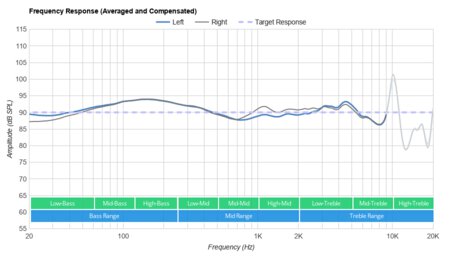
The headphones favor a more neutral-meets-consumer-oriented sound profile. They provide more mid to high-bass, but are still reasonably balanced overall for most listeners. Overall, vocals and instruments sound fairly natural. The extra low-end boom is also pleasing for more bass-heavy content like EDM and hip-hop. These headphones lack sound customization features, so you can't change the tuning without a third-party app.
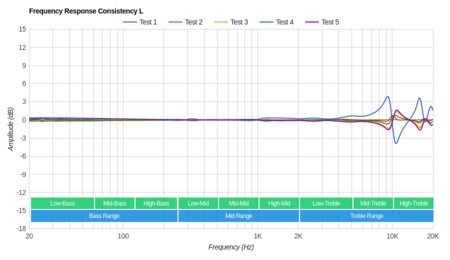

The frequency response consistency is excellent. If you can achieve a proper fit using the three sets of ear tips that come with the headphones, they'll deliver consistent sound every time you use them.

The bass accuracy performance is great. While they're a little light on thump and rumble common to bass-heavy genres, they make up for it in mid to high-bass warmth. The response overemphasizes the mid- and high-bass, adding a bit of boominess and muddiness to the sound. If you prefer a more bass-heavy sound, check out the similar Sony WI-XB400 EXTRA BASS Wireless.
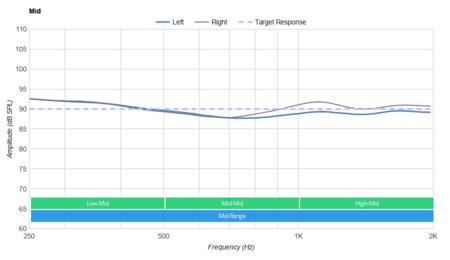
The mid accuracy is excellent. Overall, these headphones accurately reproduce vocals and lead instruments. However, the small dip in mid-mid slightly nudges them to the back of the mix, but this isn't too audible for most.
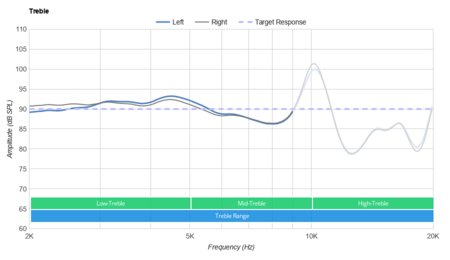
These have excellent treble accuracy. From low-treble through most of the mid-treble range, it's well-balanced and even, with some emphasis in the low- and mid-treble, yielding some harshness to vocals. There's a dip in the mid-treble that ends in a peak ending in the high-treble. This means that some, mainly harmonic, frequencies of instruments like cymbals lack detail. However, not everybody hears the high-treble frequencies the same way, as we lose sensitivity to this region over time.
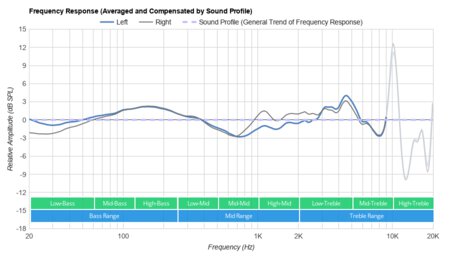
These headphones can control their sound profile well. There's a peak in the bass, a dip in the mid-mid region with a mismatch between the L/R drivers, and a peak in the low-treble. That bass peak contributes to the added boominess of the audio. While the mismatch between the drivers indicates that the right driver will output disproportionately more mid to low-treble than the left, it's only noticeable in a narrow range for instruments like woodwinds, for instance. Lastly, the peak in the treble range adds punchiness. Because these dips and peaks aren't extreme, your audio plays back without too much exaggeration or underemphasis relative to the rest of the audio.
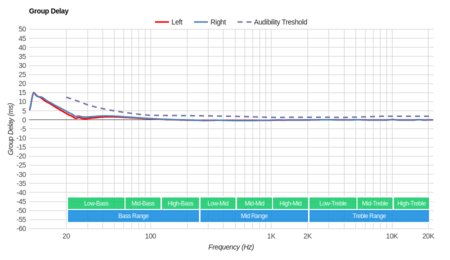
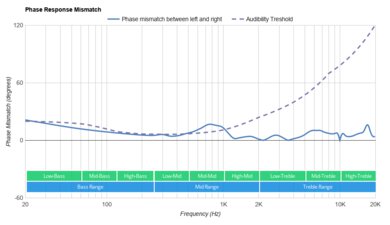
The stereo imaging is excellent. The weighted group delay is very low. Our unit's group delay is well below the audibility threshold, ensuring a tight bass and a transparent treble reproduction. Sony manufactures many headphones at different price points, and many of their similarly-priced budget headphones have good quality control and ergonomics.
Also, the L/R drivers of our unit are well-matched in frequency, amplitude, and phase response. This is important for the accurate placement and localization of objects (voices, instruments, video game effects) in the stereo image. There's phase mismatch in the mid-mid and the right earbud, which means that the right earbud plays back some mid frequencies like guitars or speech more loudly. Note that imaging varies between units.
The soundstage is poor. This is because creating an out-of-head and speaker-like soundstage largely depends on activating the resonances of the pinna (outer ear). The design of in-ears and earbuds fully bypasses the pinna and doesn't interact with it.
Also, because these headphones have a closed-back enclosure, their soundstage won't be perceived to be as open as that of open-back earbuds like the Apple AirPods (2nd generation) Truly Wireless or the bone conduction headphones, like the Shokz OpenRun Bone Conduction.
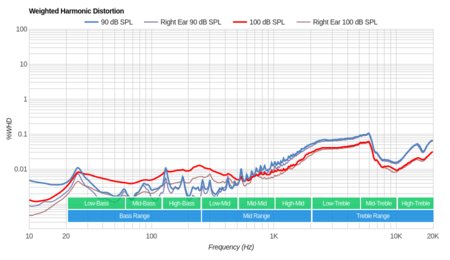
The weighted harmonic distortion performance is decent regardless of whether you listen at moderate volumes or high volumes. Most of the distortion lands in higher frequencies, but it's unlikely that you'll notice distortion at these levels as it's well under 1%.
These are the settings used to test these headphones. Our results are only valid when using them with this configuration.
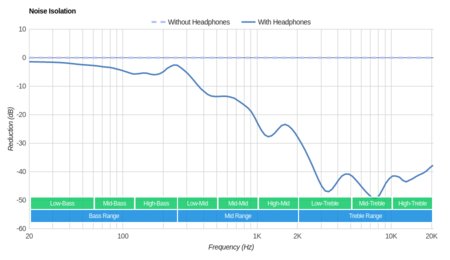
The headphones have an overall mediocre noise isolation performance. Their fit doesn't block much lower frequencies like the rumbling of a bus engine, which means they won't be ideal for commuting. On the upside, they somewhat isolate mid-range noise, like ambient chatter. They perform excellently in the treble range, responsible for fan noise and clatter, which is expected of passive isolation-only in-ear buds.
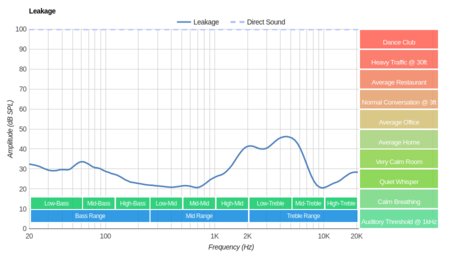
The leakage performance is excellent. The headphones don't leak in the low-bass through mid-mid ranges, which results in a thin-sounding leakage. Most leakage occurs in a relatively narrow mid-mid to mid-treble range and isn't loud in most settings. The resulting leakage sounds quiet for most offices and trebly, so you can listen to your music without disturbing others.
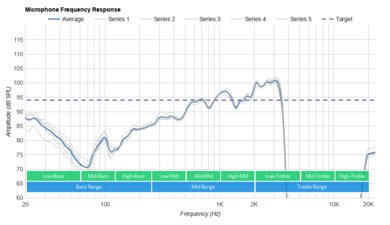
The in-line mic has a sub-par recording quality. The mic's frequency response reproduces very thin audio that lacks detail and presence. However, speech will still be understandable when captured in quiet environments. Low-pitched voices will suffer the most as the curve rolls off volume significantly in lower frequencies.
Ensure the microphone faces your mouth when using it. The downside of a cable microphone is that it can turn around, leading to muffled audio quality.
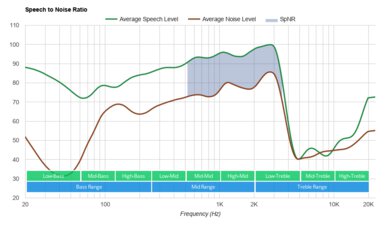
The in-line microphone is satisfactory at noise handling. The mic is best suited for quiet and moderately noisy environments. However, the mic will struggle to separate speech from ambient noise in loud situations. Similarly, if you're out and about on a call, the mic module is on a long enough cable that it can add unpleasant noise by bumping or brushing against your shoulder or neck.
We measured about 17 hours of battery life for a single charge of these neckband headphones. The battery will last long enough for a full workday or two without a problem, depending on variables like how loud your volume is. However, they can take some time to charge at under three hours. According to the manufacturer, you can fast charge the headphones for 10 minutes to yield 60 minutes of playback. Unfortunately, they don't have any power-saving features, so be sure to turn them off when you're not using them.
These earbuds are Bluetooth 5.0 compatible, meaning you get the standard SBC and AAC codec selection. They can't connect to multiple devices simultaneously and don't support NFC pairing.
The Sony WI-C310 aren't the best option to watch video content, as many folks will notice a delay between audio and video. However, some apps and devices offer some compensation.
Because the Sony WI-C310 are Bluetooth-only headphones, that's how they connect to computers.











